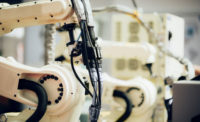Coming soon: Co-robots to help the visually impaired

As part of the National Robotics Initiative (NRI), the National Institutes of Health announced that it will fund the development of three innovative co-robots—robots that work cooperatively with people. One of these will be a hand-worn device to help visually impaired people identify and grasp objects.
Cang Ye, Ph.D., of the University of Arkansas at Little Rock, leads the project team. Their goal is to create a hand-worn assistive device that uses computer vision to identify a target object in the user’s environment, determine misalignment between the user’s hand and the object, and then convey the hand motion needed to grasp the object.
For people who are visually impaired, the device is expected to enhance their ability to move around independently in two major ways. If successful, it will make it easier to identify light-weight obstacles and move them out of the way. It also will assist in identifying and manipulating objects like door handles.
The other two co-robot projects include a smart-walker to increase mobility for older people, and a social-robot companion for kids.
Source: NIH’s National Institute of Biomedical Imaging and Bioengineering
Looking for a reprint of this article?
From high-res PDFs to custom plaques, order your copy today!







